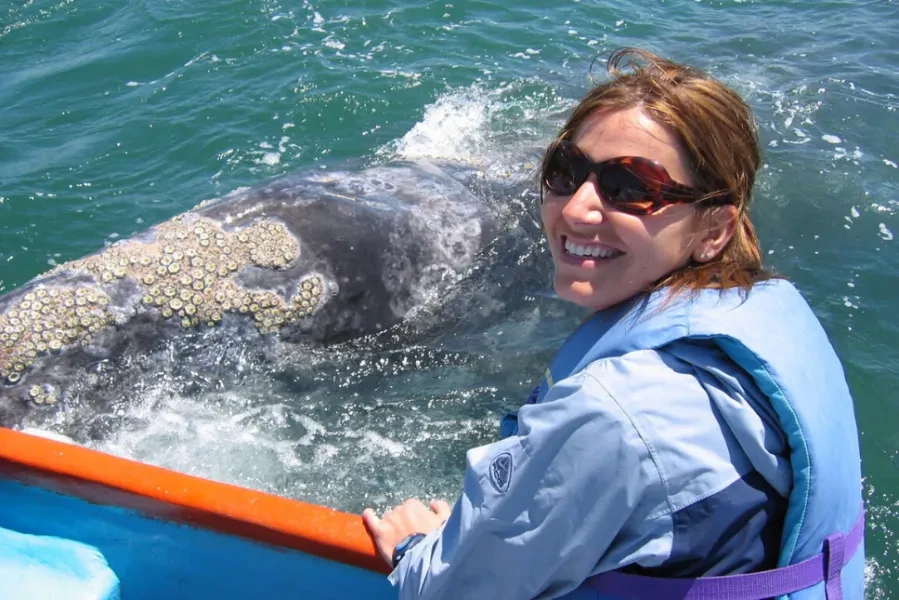Although she’s lived on the West Coast for most of her adult life, the University of Arizona Global Campus Lead Faculty in the Department of Education & Liberal Arts for the College of Arts and Sciences, Dr. Allison Rief, considers Connecticut home. Growing up, the tiny town she lived in had one simple claim to fame.
For more than 130 years, it’s had a tall flagpole proudly standing smack dab in the middle of the street. If you ask anyone in town for directions, they all usually somehow reference the legendary landmark. Today that flagpole still stands. However, when most people hear the town’s name of Newtown, it’s not the first thing that comes to mind. Instead, it’s the tragic mass murder that took place in 2012 at Sandy Hook Elementary School.
When word about the school shooting hit the news, Dr. Rief was teaching at a Title I school in South Central L.A. and couldn’t believe that the quiet elementary school she had attended as a child was the center of such a tragedy.
As a teacher who had dedicated her career to working alongside typically marginalized populations, it reinforced her fervor to become an institute of change for her students and their families.
“As an educator, I emphasize equity over equality,” Dr. Rief says. “Equality in the classroom would mean that everyone is treated the same and provided with the same instruction. This implies that the classroom, and the larger world, is a level playing field. However, this is not the case.”
Dr. Rief has found she’s most successful when she works alongside her students, learning from them and with them.
“This puts students at ease and helps to empower them within their own education,” she explains.
Her hands-on approach made such a discernible impact in the lives of her students that in 2010 she was awarded Teacher of the Year for Los Angeles County and the Los Angeles Unified School District — the second-largest school district in the nation.
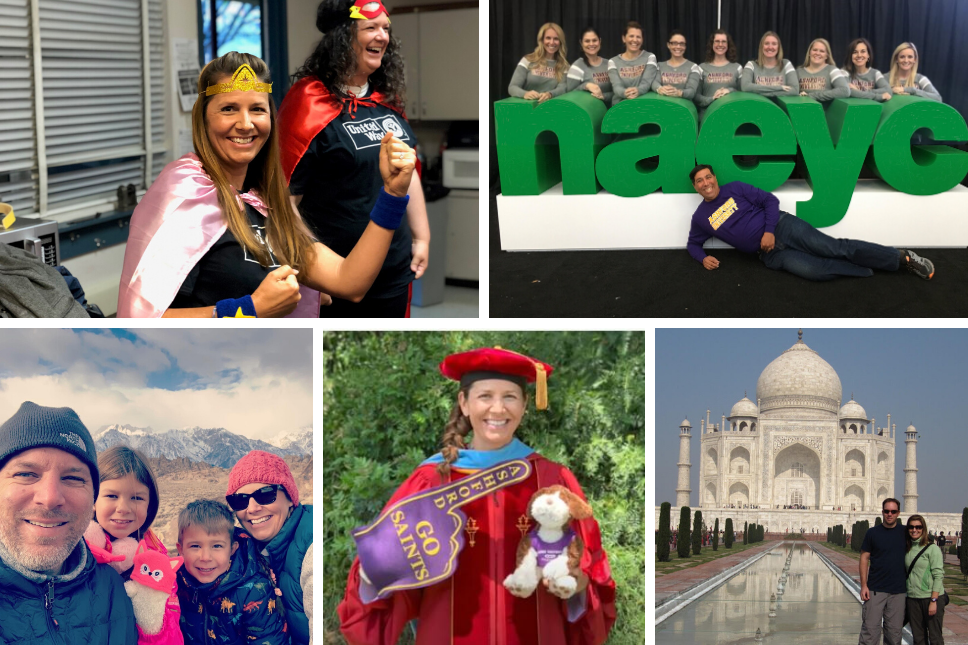
Getting to Know Dr. Allison Rief
Now that she is teaching at the Global Campus College of Arts and Sciences, she acknowledges that it’s a little different working with adults.
“You have to be able to understand how people think and to tap into that. Obviously, the adult brain works differently than kids. Kids learn because they’re sponges. With adults, you have to figure out what makes them tick and understand why they came back to get an education.”
As a mother of two (8-year-old Lucie and 5-year-old Luca), she’s well-versed in the working of little minds as well. Her husband Martin is a biomedical engineer, and the family stays busy playing sports and doing arts and crafts.
“As an early childhood educator, you must have a lot of creative juices,” she says. “You should see the craft closet at my house!”
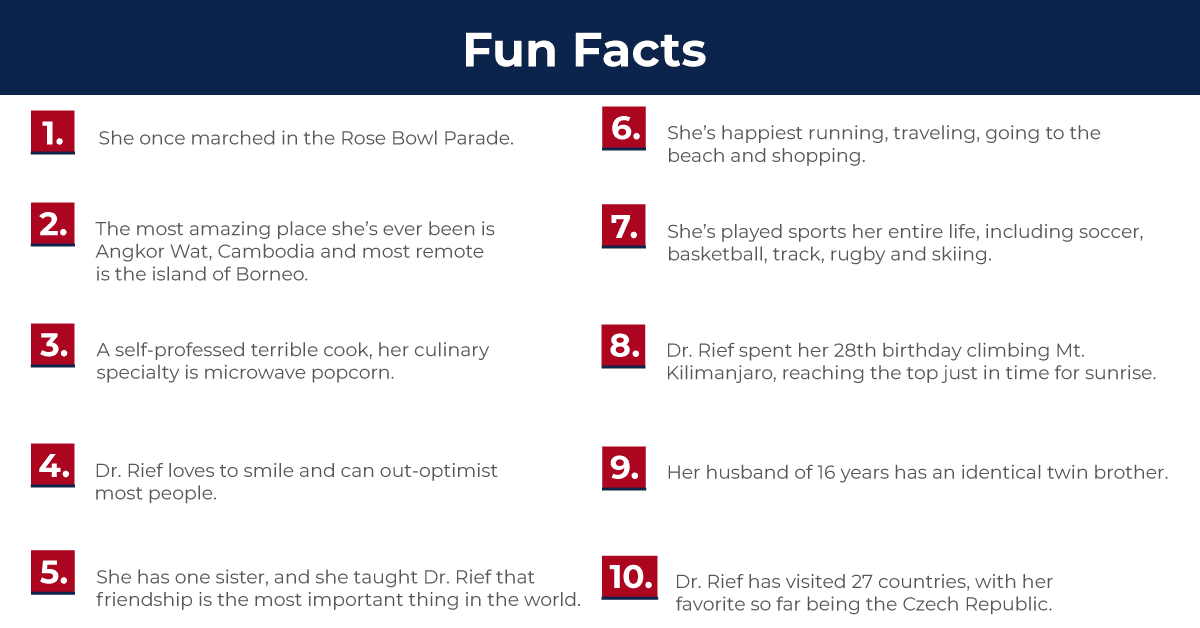
An inherent optimist who knows she absorbs knowledge best by visually and physically doing things, Dr. Rief says her brain works at its peak when she steps away from the computer. Running and getting out to enjoy some fresh air is her go-to when she needs to clear her mind. And with that clarity she is able to stay more open-minded and positive.
“I find that if you can approach a situation with positivity and openness, you are more likely to appreciate the outcomes,” she says.
Read on to learn more about Dr. Rief's experience as an educator.
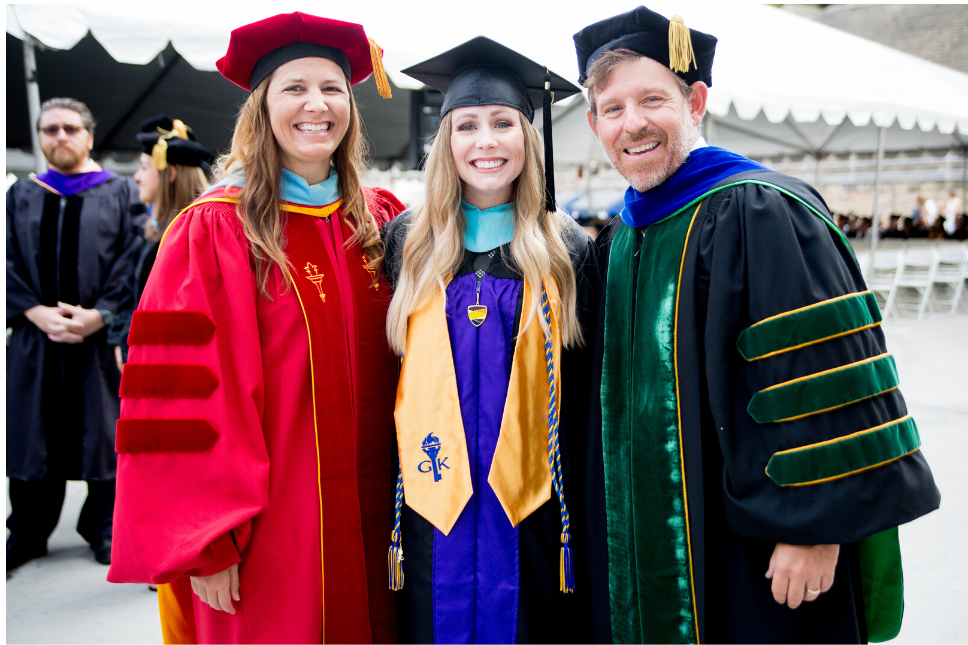
Dr. Allison Rief, left, at commencement with Alum Cara (Nickels) Russel and Tony Farrell, Chair of the Department of Education and Liberal Arts for the College of Arts and Sciences.
Global Campus: How did you get your start in Early Childhood Education (ECE)?
Dr. Rief: I started as a literature major and took a lot of courses in child development, but always knew I wanted to work with kids. I had incredible teachers as a child. I think it set me up with a really great idea of what can be accomplished through good education. I knew I wanted to be a teacher, so I took child development courses and some practicums where I was placed in schools.
One of my favorite places was a school in Chula Vista very close to the U.S./Mexico border. All of the parents worked so hard for their kids to get better opportunities than they had. Seeing that dedication, the struggle. It made me want to be a part of that. To be a person who could provide opportunity rather than deny access.
That’s what I love about UAGC. I can still see those same changes. I can see a mom graduating at 50 to prove to her kids that they can do it, too. They can make their lives better and it’s never too late. Being persistent, following through, and going for your goals regardless of your age.
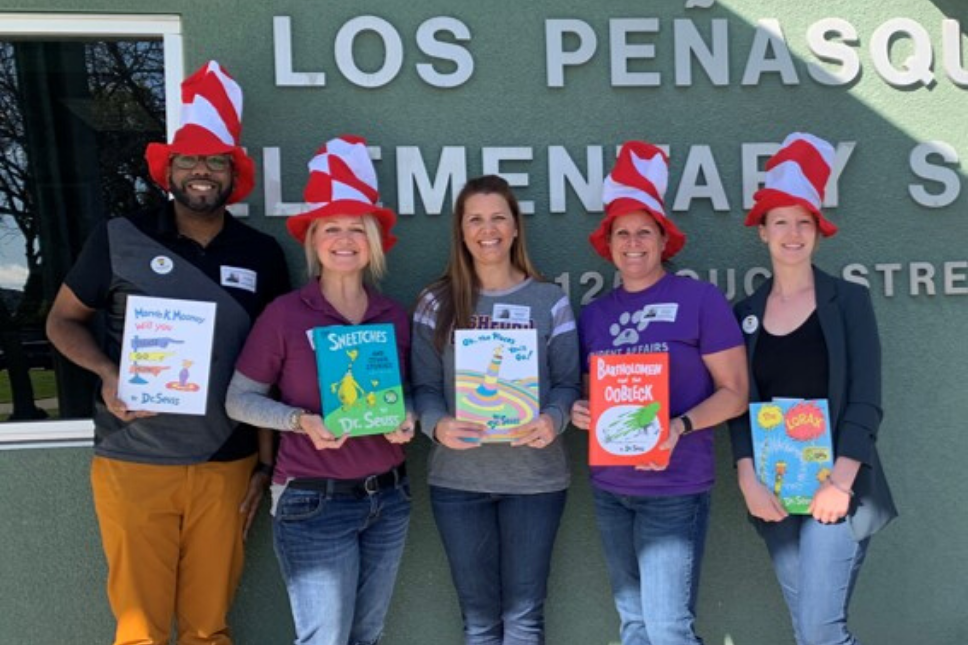
Dr. Allison Rief, center, with her colleagues on Read Across America Day 2020.
Global Campus: What do you enjoy most about the field?
Dr. Rief: I wish that I had a novel answer to this, and know it will sound so very cliché, but I love when you are able to witness when the light bulb goes off for a learner. When you can see them figure something out, accomplish something they have never done before, or have learning click. It’s the light bulb moment.
One thing that I loved about working with little kids is how they embrace learning and novel situations with absolute joy. They are endearing and curious and so very full of love.
Global Campus: What’s your philosophy when it comes to education?
Dr. Rief: I am a social constructivist. I believe we co-construct knowledge through interactions with others. The learner must be an active participant and engaged in the learning for it to be meaningful. I keep this quote very close in mind whenever I start a new course or need to re-center my teaching: “Education must begin with the solution of the teacher-student contradiction, by reconciling the poles of the contradiction so that both are simultaneously teachers and students.” (Paulo Freire’s Pedagogy of the Oppressed, 1993).
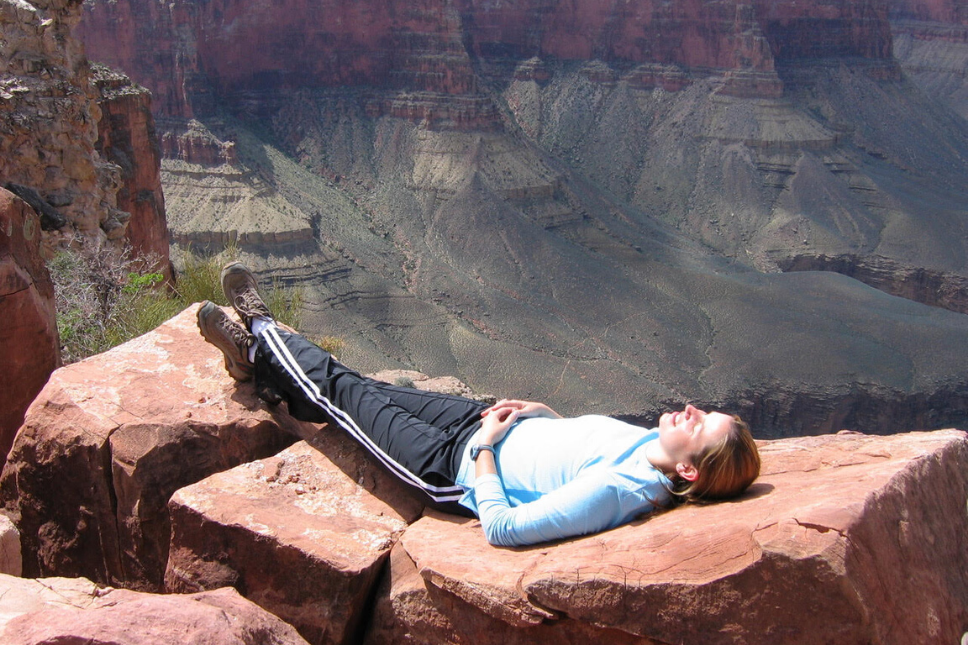
Dr. Allison Rief enjoys the outdoors while resting at the Grand Canyon.
Global Campus: Do you have any advice for students to help them achieve success?
Dr. Rief: Learning is not meant to be easy. For me, the mark of true education is restlessness. It causes you to look at things in a new way. When you have your thinking challenged, it is not always comfortable. It creates cognitive dissonance, which is what happens when you have conflicting beliefs. It causes discomfort. Your brain tries to reduce this discomfort and restore balance; to make sense of it. It requires metacognition, which is thinking about how you think.
Learning is hard. But the feeling of discomfort is what causes the learning to take place. Embrace that discomfort and come out of the experience a different person than the one who went in.
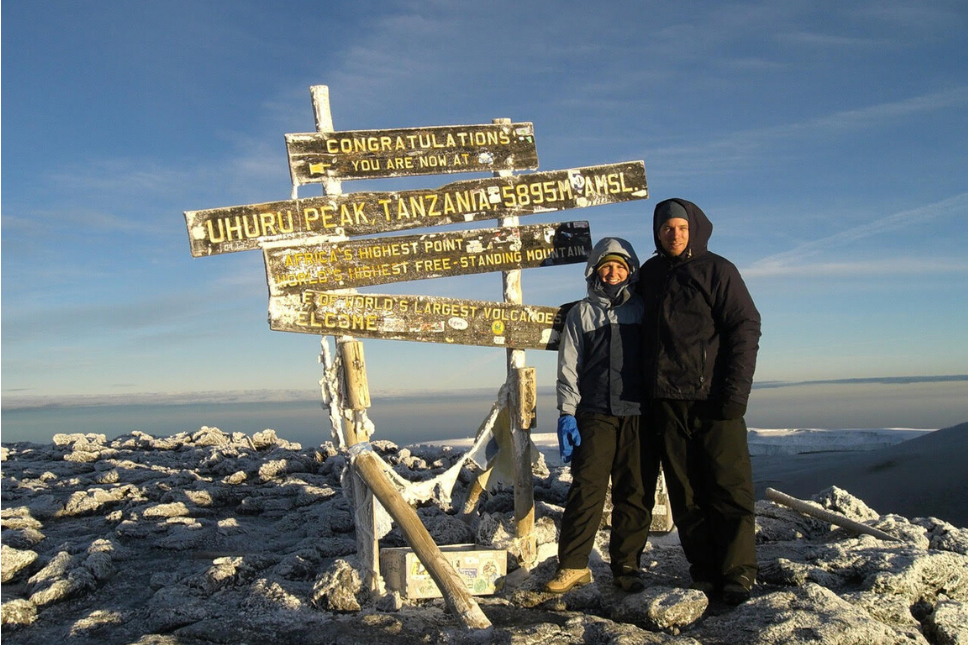
Dr. Allison Rief celebrates her 28th birthday at the top of Mt. Kilimanjaro.
Global Campus: What’s the greatest advice for someone trying to overcome adversity?
Dr. Rief: Think about your “why.” Think about why you started this undertaking. Be centered by that mindset. Picture yourself attaining your goals. And ask for help. Seek out support. Dr. Tony Farrell, chair of the Department of Education and Liberal Arts for the College of Arts and Sciences at UAGC, starts every meeting with our mission statement, which is our “why.” This has been ingrained into me, and I try to think about my own personal and work “whys” daily.
My work “why” is: I believe that education brings personal and communal growth and is a tool to overcome generational and situational poverty. A high-quality education provides access to worlds and experiences that were previously unreachable.
--
Written by University Staff
Ashford University is now the University of Arizona Global Campus
